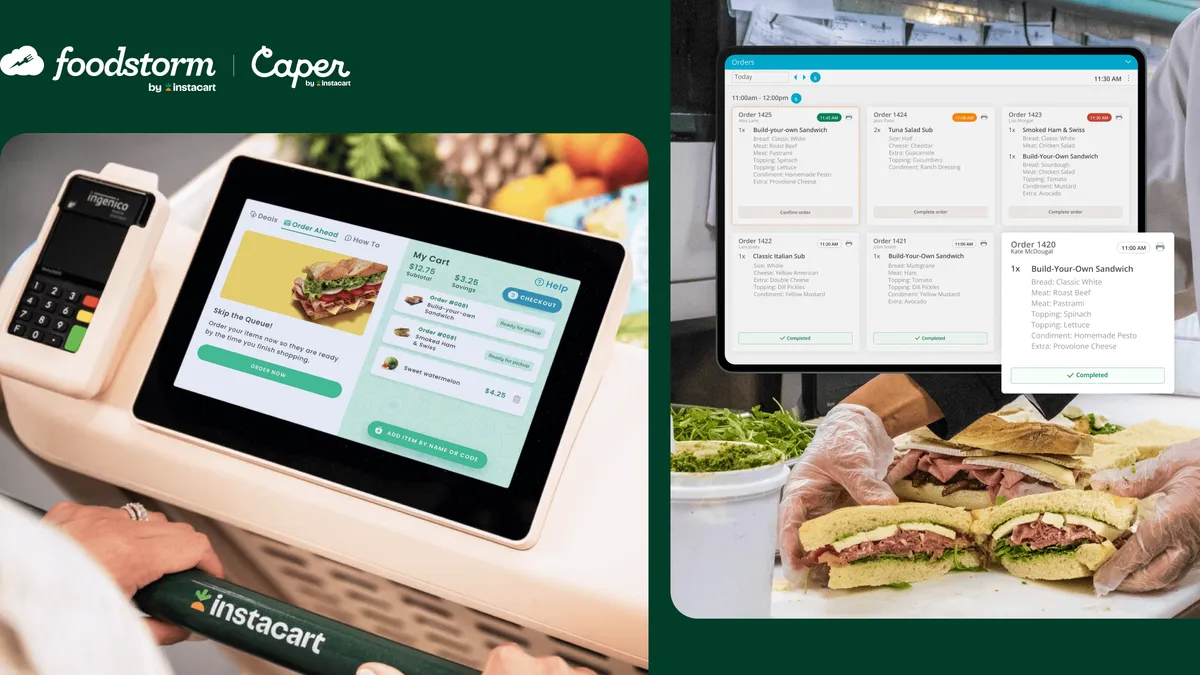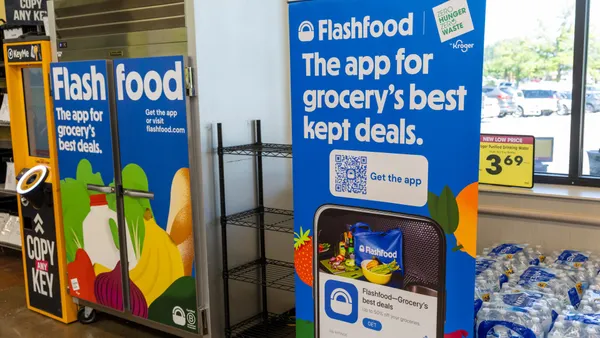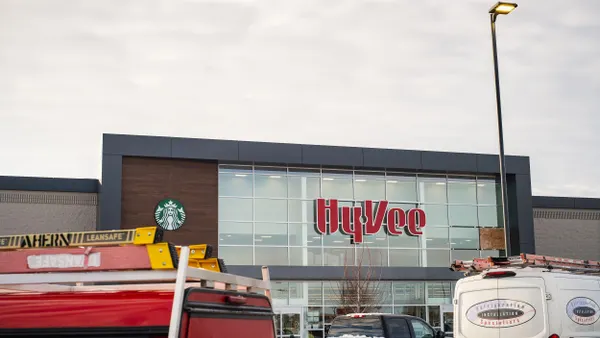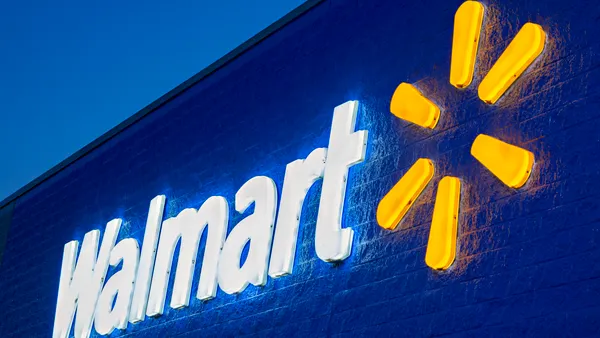Dive Brief:
- Instacart announced Thursday several artificial intelligence updates to its omnichannel digital commerce platform, called Instacart Storefront, and its Caper Cart smart carts.
- For Instacart Storefront, Instacart is adding an AI-powered conversational search and an “In-Store” mode for retailers’ apps. The Caper Carts update now allows customers to order made-to-order items, such as deli sandwiches, from the carts and also includes new in-store rewards and improved AI models for better item detection.
- Instacart said the AI updates are aimed at helping retailers bridge the divide between online and in-store shopping with personalized experiences, moving the ball forward on omnichannel innovation.
Dive Insight:
The AI updates follow Instacart’s disclosure in its recently filed S-1 form, which details its plans to become a publicly traded company, that extending AI applications is one of its planned growth strategies as it taps into its extensive data trove.
“[G]ood data is the foundation for good AI solutions for retailers,” Instacart Chief Operating Officer Asha Sharma said in a statement. “Our operational advantage is built around our dynamic grocery catalog – one of the largest in the industry – which includes 1.4 billion items and more than 6,000 item updates per second.”
The AI-powered conversational search capability uses OpenAI’s ChatGPT alongside Instacart’s own AI and product data to help users answer open-ended questions like “What do I need to make fish tacos?” in the search bar on retailers’ storefronts.

The In-Store mode, which will be available in select areas, allows consumers in retailers’ brick-and-mortar stores to see what’s in stock, access in-store promotions and discounts, sort items by aisle and get important details about items on their shopping lists, such as whether products are EBT SNAP-eligible, per the announcement. Instacart said the store mode feature gives retailers deeper insights into consumer behavior regardless of whether they shop online or at a store.
Instacart said Food Bazaar, Gelson’s, and Stew Leonard’s are using In-Store mode and noted that the capability is being tested on the Instacart App.
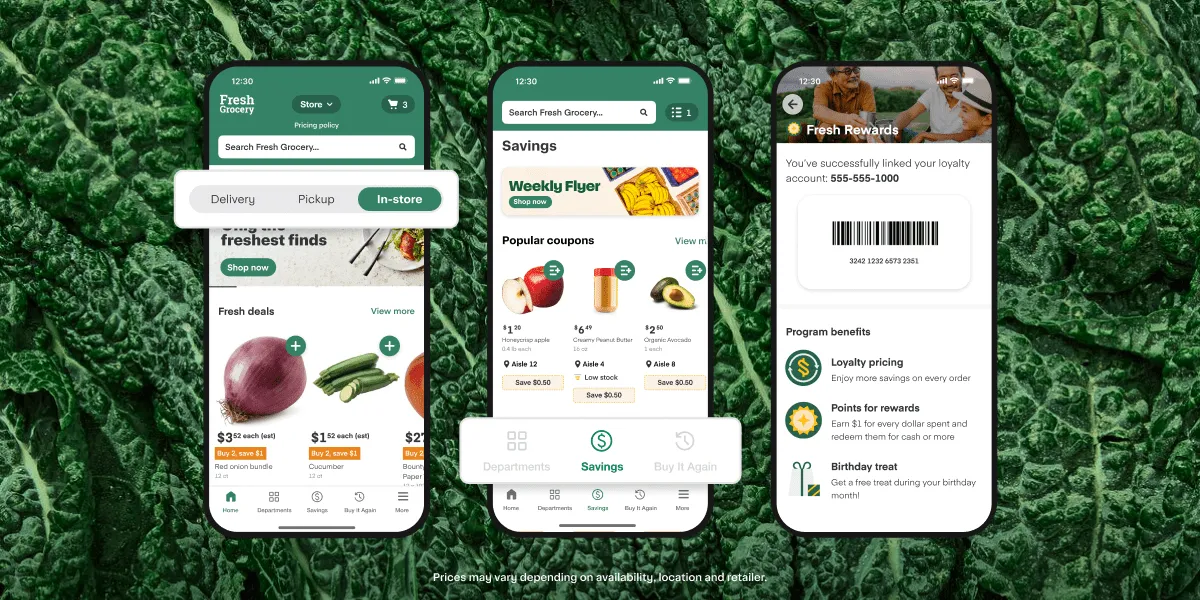
Other Instacart Storefront updates include new merchandising and marketing capabilities such as shoppable digital flyers, more self-serve capabilities tied to becoming an e-commerce administrator, and better tooling and analytics.
Updates to the Caper Carts improve the speed and precision of the camera and weight sensors, add the ability to order made-to-go items through Instacart’s order management solution, FoodStorm, and provide new in-store rewards such as coupons, badges and points. Customers can now receive rewards for completing actions like logging into a loyalty account, adding certain items to the cart or trying a Caper Cart for the first time.
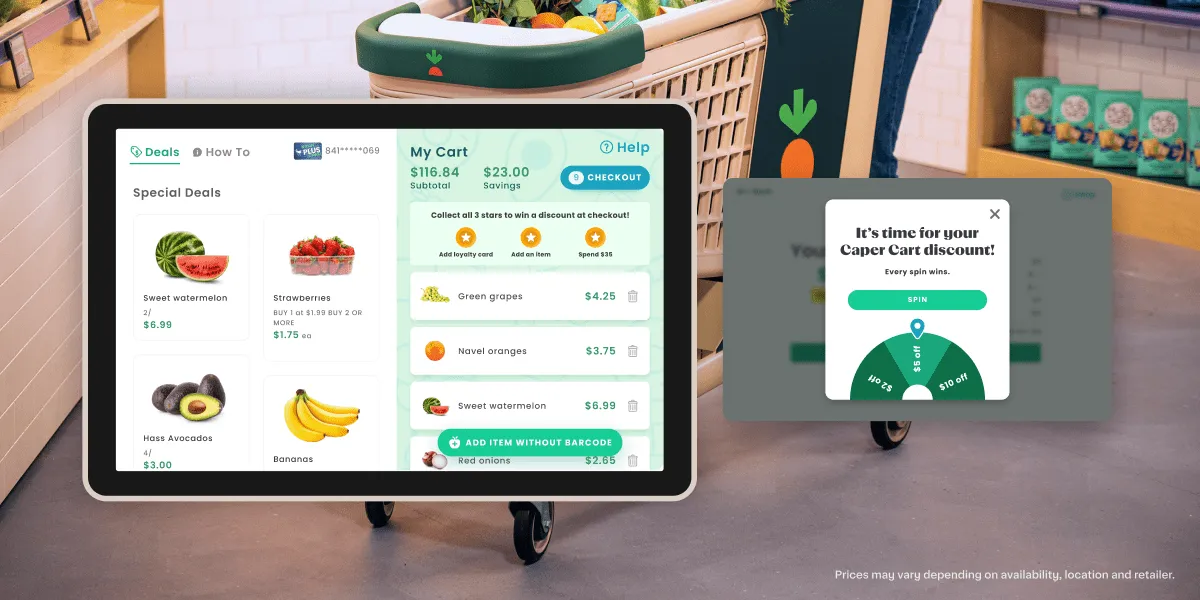
Instacart noted that the Caper Carts’ AI models update automatically and “learn over time.”
Additionally, a new Caper Cart dock allows retailers a place to permanently store and charge the carts, which already have stacked charging capabilities.
Instacart said in its S-1 filing that it is “well positioned to lead AI product innovation in the online grocery space,” noting that it plans to combine its machine learning foundation with its large amount of data across its retailers, product catalog and customers as it develops AI models geared toward more personalization and a better customer experience.
“With the rapid innovation in generative AI, we believe we can create new personalized, inspirational, value-driven shopping experiences that enrich our customers’ relationship with food and how they engage with the retailers and brands they love,” the company said in the filing.
Instacart has already incorporated AI and machine learning solutions into its platform, offerings, services and features, including its Ask Instacart generative AI tool, which helps consumers personalize their shopping, and its Instacart AI plugin for ChatGPT. Last September, Instacart announced it had acquired Eversight, an AI-powered pricing and promotions platform, for an undisclosed amount.
“Our plugin enables customers to turn inspiration for meal planning into ingredients on their doorstep,” the filing noted.
Instacart’s expansion of AI capabilities to its solutions for retailers comes at a time when technology investments are increasing for many food retailers, yet budgetary concerns with emerging tech adoption still remain a barrier for them.
One-quarter of retailers and more than a third of suppliers are using AI to track product preferences and spending to anticipate consumer wants and needs, Mark Baum, FMI’s senior vice president of industry relations and chief collaboration officer, said during a press call in July.
While technology innovation is gaining steam in the grocery industry, FMI’s research indicates grocers have been more focused on technologies aimed at maintaining existing systems and operations. Only 12% of surveyed food retailers said they used in-store technology such as robotics and AI as part of their service differentiation strategies in 2022, per the trade group’s 74th annual Industry Speaks report.
E-commerce remains an important business for Instacart even as it invests in AI-based capabilities. For example, the company announced on Wednesday that Giant Eagle is rolling out same-day delivery powered by Instacart chainwide.



